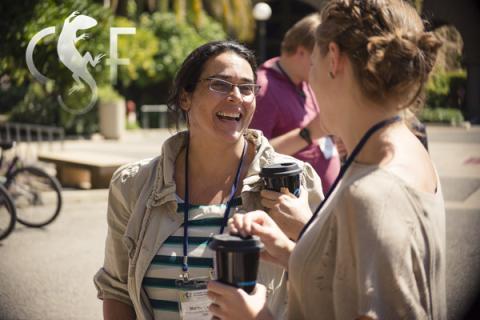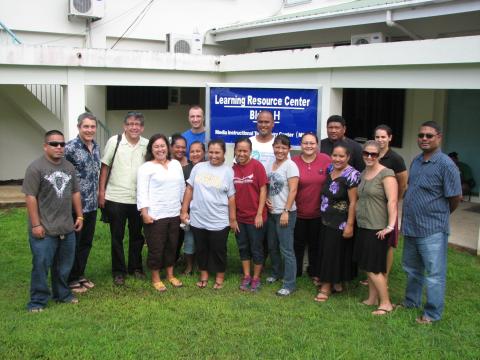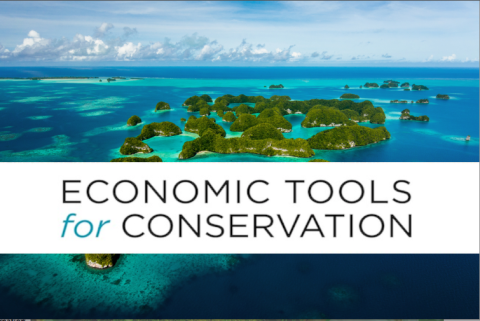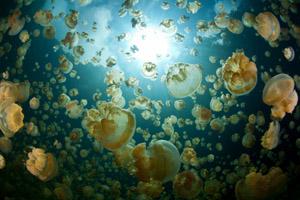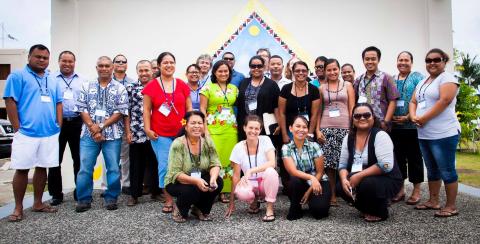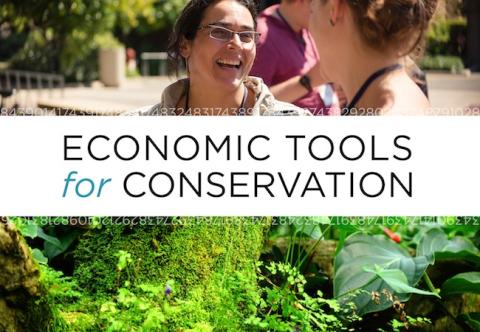
Koror, Palau
"The amount of information given to me was huge and has, over a very short time, significantly altered my mentality as a conservationist/biologist. I'll cherish that for the rest of my career." --Palau 2014 Course Participant
Twenty-five participants representing 4 countries and 21 organizations attended CSF's Economic Tools for Marine Conservation course in Palau. During the two-week training, participants gained an understanding of our core curriculum which includes Microeconomics, Natural Resource Economics, Environmental Valuation, and Cost-Benefit Analysis. Additional topics tailored to the region and sector of focus included Spatial Planning and Impact Evaluation. Instructors were drawn from CSF, as well as universities and institutions in North America, Australia, and Fiji. Many thanks to our partners at PICRC for working with us to put on an excellent training!
"I am definitely applying the topics I've learned to Palau's commercial fishing industries in developing a more robust, well informed and analyzed policy for Palau! I didn't realize there was so much that needed to be done, to be learned, and this will only benefit us in the future!" --Palau 2014 Course Participant
ORIGINAL COURSE ANNOUNCEMENT
Conservation Strategy Fund is offering its Economic Tools for Marine Conservation training course, March 17-28th, 2014 located at the Palau International Coral Reef Center in Palau. This course is being offered thanks to a grant from the David and Lucille Packard Foundation.
The training will support conservation of marine resources in the region by equipping conservation practitioners, natural resource managers and community leaders with the principles and tools of conservation economics.
The Western Pacific is characterized by a marine environment that is biologically, socially and economically important. However, this natural wealth is threatened by a series of interlocking challenges. Integration of the once-isolated islands in the region with global markets has led to rapid development. Coupled with population growth, this transition is placing increasing pressures on natural resources. Pollution, infrastructure development, invasive species, deep-sea mining and over-fishing all threaten the region’s ecosystems and future natural and economic health. Outside pressures, including global warming and foreign exploitation of fishery resources, are additional serious concerns for these island nations.
During the comprehensive two-week course, participants will learn to use economics to be more strategic and successful in their conservation work, and experience a transformational shift in how they view environmental issues. The training will cover economic fundamentals, natural resource economics, fisheries management, environmental policy, spatial planning, environmental valuation, economic impact evaluation, communication and negotiation techniques, and hands-on experience with cost-benefit analysis. A workshop component will also be included to help participants develop concrete applications of these economic tools. Issues will include: fisheries management policies; incentives for coastal area protection; assessing the costs and benefits of infrastructure or tourism development; and estimating the benefits of ecosystem services provided by mangrove forests and coral reefs. These skills are crucial at a time when global-scale environmental changes are being driven by a diversity of economic factors, and when conservation leaders are striving to harness opportunities to reward the preservation of ecosystem services.
The course is CSF's second in the Western Pacific region and its first to focus primarily on marine natural resource economics and fisheries management. Our last course was offered in 2012 on Pohnpei and received excellent feedback.
"I gained a wealth of knowledge and understanding of economics and how it ties in with conservation and the human aspect of natural resource management." - Vanessa Fread, Island Research and Education Initiative
"Having been involved in formulation of development policies for Kosrae, this course has really shown me that conservation is indeed vital for economic development." - Palikkun Kilafwasru, Department of Resources and Economic Affairs, Kosrae State
"This [economic tools] is the biggest gap and weakest link in our ongoing efforts to achieve conservation and sustainable development goals for our region; I learned more in three days than I did during my entire economics course for my MBA degree." - Tiare Holm, Sustainable Decisions, Palau
BENEFITS
Participants gain:
- An essential foundation in basic economic concepts and language.
- Insight into the drivers of marine environmental problems.
- The ability to formulate more effective solutions and policies for conservation and fisheries management.
- Skills to evaluate the costs and benefits of natural resource management and development decisions, and the ability to identify the best opportunities to apply economics to marine conservation.
- Invaluable practice using communication and negotiation techniques to articulate environmental values in a language that communities, businesses, and governments can understand.

Course Participants, Pohnpei 2012.
PARTICIPANTS
This course is for people at the forefront of conservation challenges, including managers of conservation programs and protected areas, directors of non-governmental and community organizations, and representatives of government agencies. Applicants from a variety of disciplines such as biology, law, anthropology, or economics are encouraged to apply. Previous training in economics not essential. Applicants must be proficient in spoken and written English.
Participants will be drawn primarily from Palau, with additional participants drawn from elsewhere in Micronesia and Indonesia.
INSTRUCTORS
Economic Tools for Marine Conservation in the Western Pacific will be taught by experts in environmental economics who also have extensive field experience and understand real-world conservation challenges related to the marine environment. They are drawn from CSF staff as well as several leading academic and international institutions such as, Harvard University, Duke University and IUCN. Links to individual instructor profiles are provided at the bottom of this page.
COST
CSF will cover the cost of tuition, accommodation, materials and 3 meals per day for accepted applications. Travel stipends are also available.
"The course gave me a broad vision of the tools of economics. We received enough knowledge to understand all the valuation and cost benefit analysis done in the 'real' world. I got all that I expected and much, much more! Coming to the CSF Course and mingling with the community and my colleagues was such a pleasant and motivating experience I can't find a way to thank you all!"
Watch below as CSF Instructor David Johnson explains why economics has a place in conservation:

